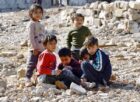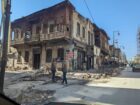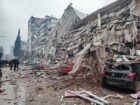Pope Francis sent pharmaceuticals to earthquake victims in Turkey, where two deadly earthquakes in February killed at least 50,000 people and left more than 200,000 buildings severely damaged or razed to the ground.


Pope Francis sent pharmaceuticals to earthquake victims in Turkey, where two deadly earthquakes in February killed at least 50,000 people and left more than 200,000 buildings severely damaged or razed to the ground.

Catholic aid agencies are working alongside other international humanitarian organizations to house, feed and administer additional life-saving assistance to tens of thousands of people in Syria and Turkey.

As the initial rescue work in Turkey and Syria shifts to recovery and clean up following the Feb. 6 earthquakes that killed more than 41,000 people, many are criticizing the Turkish government not only for its unsafe buildings but also for its lack of a coordinated rescue response that included a 12-hour shutdown of Twitter.

Unimaginable images of a father holding onto his teenage daughter’s hand as she lay dead under a collapsed building and babies being pulled from the rubble of an earthquake that devastated parts of Turkey and Syria on Feb. 6 hit especially close to home for families in Brooklyn and Queens with relatives in the ravaged region.

As grieving Queens faithful mourned the loss of a local family killed in the earthquake that ravaged Turkey and Syria earlier this week, the pastor of Our Lady of Sorrows counseled them to “not lose the horizon of life.”

In response to the devastating earthquake that struck northern Syria Feb. 6, the patriarchs and heads of churches in the country demanded the lifting of “unjust sanctions” on the Syrian people, calling for “exceptional measures” to secure delivery of humanitarian aid.

Catholic humanitarian agencies are launching emergency relief campaigns following Feb. 6’s devastating earthquakes in Syria and Turkey, which have so far killed more than 11,200 and injured upward of 40,900.

Pope Francis expressed his “spiritual closeness” and “solidarity” with those affected by a pair of powerful earthquakes that struck Turkey and Syria Feb. 6.

A powerful earthquake struck Turkey and Syria in the early morning hours of Feb. 6, killing hundreds and leaving thousands more wounded.

The patriarch of the Syriac Catholic Church pleaded for “immediate and lasting peace in northeastern Syria and the preservation of innocent lives, especially for Christians, who are the original and founding component of Syria.”